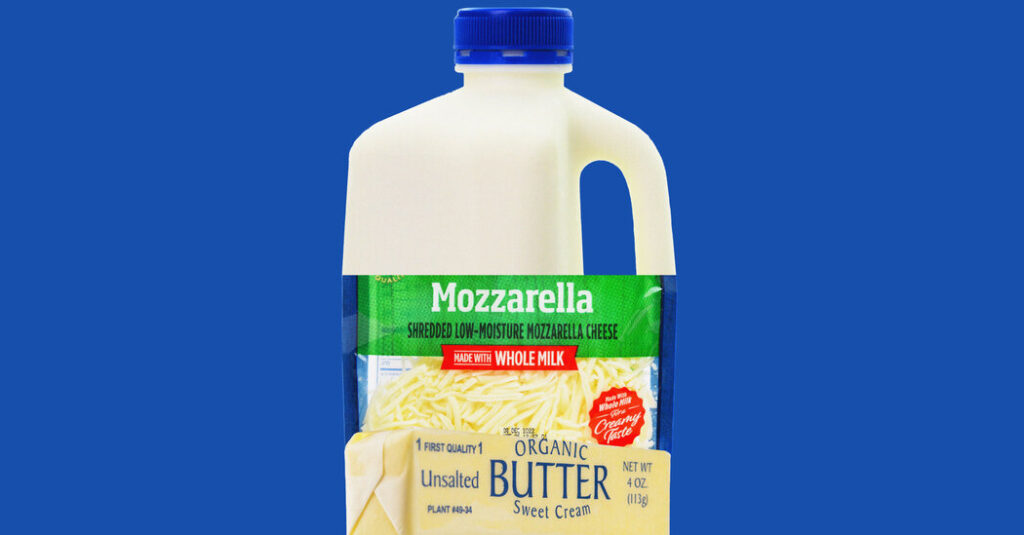Since the 1980s, federal health officials have urged Americans to opt for lower-fat dairy products, like skim milk and reduced-fat yogurt, over full-fat versions. But Robert F. Kennedy Jr. and other leading figures in the Make America Healthy Again movement have recently suggested that they are going to “elevate” whole milk and other dairy products in the upcoming government guidance on what to eat and drink for good health, called the Dietary Guidelines for Americans.
Health experts have long recommended avoiding full-fat dairy because it is high in saturated fats, which in excess can raise cholesterol and the risk for heart disease. It is also higher in calories than reduced-fat versions, potentially increasing the chances of gaining weight or developing obesity.
But these recommendations were based on older studies that found links between diets high in saturated fats and heart disease, but which didn’t look into the health effects of dairy specifically.
We’ve been telling Americans to prioritize low-fat dairy products “based on almost no evidence” showing they’re better for health, said Dr. Dariush Mozaffarian, a cardiologist and the director of the Food Is Medicine Institute at Tufts University.
When you look at the more recent body of evidence on how dairy influences health, you’ll find that the study results are “all over the map,” said Richard Bruno, a professor of human nutrition at the Ohio State University. “Some say that it doesn’t harm or help you, some say that it might harm you a little bit, and some say it’s actually very helpful.”
What the Research Suggests
Various studies over the decades have examined, with mixed results, what happens to people’s health when they consume different types of dairy products.
In one study from October that included about 74,000 adults in Norway, for instance, researchers found that those who consumed the most whole milk were 7 percent more likely to die of cardiovascular disease than those who consumed the least.
But another study from September, which followed about 3,100 adults in the United States for 25 years, concluded something different. Those who consumed the most full-fat dairy (including whole milk and cheese) had a 24 percent lower risk of developing an early sign of heart disease (called coronary artery calcification) than those who consumed the least full-fat dairy.
A small randomized clinical trial from 2016 found a more neutral result: Following a blood-pressure-lowering diet that incorporated full-fat dairy reduced blood pressure just as well as following a version of the diet using low-fat dairy.
Studies have also shown that consuming full-fat dairy does not cause more weight gain than low-fat dairy, even though it is higher in calories. In a 2020 analysis of 28 studies, researchers found that children who consumed whole milk did not tend to gain more weight than those who consumed low-fat milk. An older study from 2014 on adults concluded the same.
As with most nutrition research, many of these studies were observational — meaning they could spot associations between certain eating patterns and health outcomes, but they could not prove cause and effect. Many of the studies were also small or performed on narrow groups of people, making it challenging to draw firm conclusions.
Nevertheless, a group of nutrition experts from around the world wrote in The American Journal of Clinical Nutrition in May that most of the recent research suggests that when it comes to cardiovascular health, low-fat dairy does not seem to be preferable to full-fat dairy, or vice versa.
Why Dairy Fat May Be Special
We don’t know exactly why full-fat dairy is sometimes linked with better health, Dr. Mozaffarian said.
One theory is that most dairy products like milk, cheese and yogurt contain not just saturated fats but other types of fats called polar lipids, Dr. Bruno said.
There’s still a lot we don’t know about how polar lipids influence health, but some animal studies (mainly in rodents) have suggested that they may lower inflammation throughout the body and reduce the amount of cholesterol absorbed in the gut, he said.
Another explanation has to do with the complex structure and interaction of dairy’s other components (called the food matrix). Cheese, for instance, is often high in saturated fats, but it also contains beneficial bacteria, protein, vitamins and many other substances that might change how the body digests the fat, said Benoit Lamarche, director of the Nutrition, Health and Society Center at Laval University in Quebec. These might help prevent, or at least mitigate, the harms of saturated fat, he said.
Butter is one type of dairy product that doesn’t seem to offer these health benefits. It is composed mostly of saturated fats and few other beneficial nutrients, so when consumed in excess, it can raise bad cholesterol, increasing the risk for cardiovascular disease.
To explain why full-fat dairy wouldn’t cause weight gain, experts point to its satiating effect. One cup of whole milk contains nearly twice the calories as one cup of skim milk, but because it does a better job of filling you up, you might consume fewer calories from other foods, said David Jacobs, a nutrition epidemiology researcher at the University of Minnesota.
The Bottom Line
The experts we spoke with agreed that there is not enough evidence to recommend one type of dairy fat over the other. Dr. Bruno said that instead, people should eat whatever type they prefer — as long as it fits into their diet.
And there are good reasons to eat it. Most dairy products contain protein, vitamin D, calcium and — in the case of fermented dairy products like yogurt, kefir and some cheeses — gut-friendly bacteria. Consuming these nutrients through dairy, especially if you aren’t getting them from the rest of your diet, is “a big win,” Dr. Bruno said.
Just keep in mind that not all dairy products are healthful. Butter is extremely high in saturated fats and can put your heart at risk, and processed dairy products like chocolate milks and ice creams can be loaded with added sugars, which in excess can lead to various health issues like obesity and Type 2 diabetes.
If the upcoming dietary guidelines end up elevating full-fat dairy, don’t interpret that to mean that all foods containing saturated fats are harmless, Dr. Jacobs said. Processed meats and many baked goods and fried foods, which are high in the fats, can be harmful to health.
Caroline Hopkins Legaspi is a Times reporter focusing on nutrition and sleep.
The post Is Full-Fat Dairy Healthier? appeared first on New York Times.



